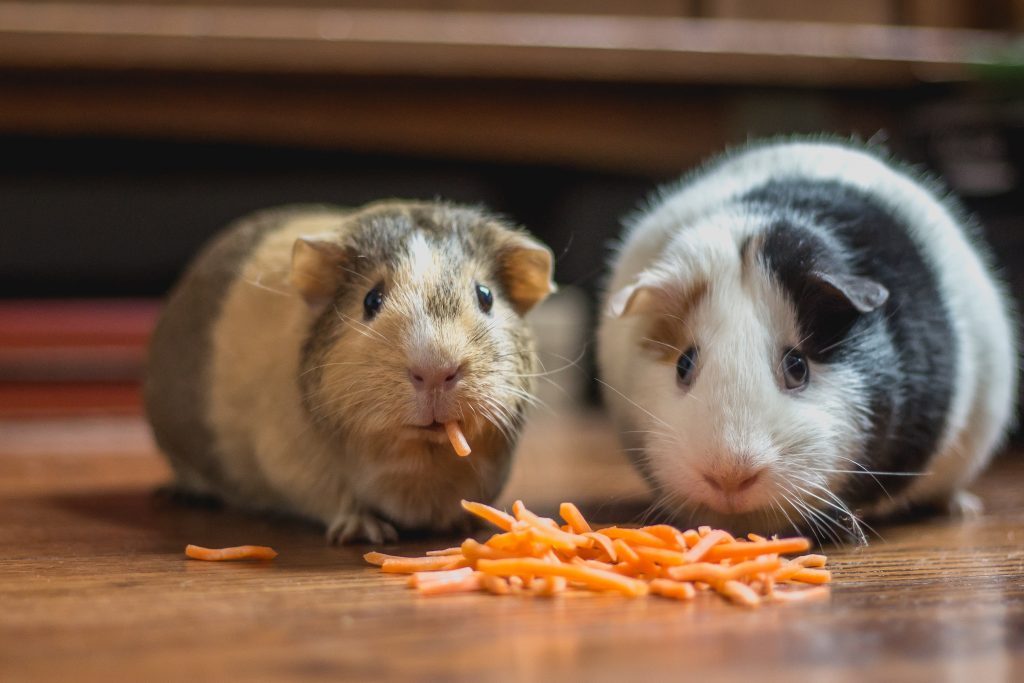GUINEA PIGS
Adult body weight 750-1000gm
Average daily water intake 10mls per 100gm body weight
Average life span 4-8 years
Body temperature 38.6 deg.C
Sexual maturity male: 9-10 weeks,
Female: 4-6 weeks
Weaning age 21 days
Guinea Pigs are prone to skin problems (often because of Vit.C deficiency or a mange infection.). Often homeopathic Sulphur 6c in the drinking water for 3-4 days clears the latter condition; however there are other remedies such as Graphites, Ant. Crud.,or Psorinum. If the condition persists see your animal naturopath.
Vit C
Humans and Guinea Pigs do not make their own Vitamin C so this has to be watched in your pet.
A deficiency may occur following dietary changes and the Guinea Pig may have swollen and painful joints, resists moving about and lose condition. Vitamin C supplementation and revising the diet will rectify this. If your Guinea Pig is really down to it following illness give a few doses of Phos ac. or Ferr.phos., to restore vitality.
Diarrhoea –Prompt action and good nursing are essential as survival time is limited.
Diarrhoea: whilst not a specific ‘disease’, it is one that may occur, especially with owners new to Guinea Pig ownership. It often results from changes to the diet, chilling, shock, being fed milk, overuse or incorrect antibiotics, or over enthusiastic cleaning out of the droppings
Diarrhoea after severe fright Aconite
Diarrhoea from general nervousness Arg nit, or Gelsemium.
Diarrhoea after injury Arnica
Where cold, wet conditions may have started it Rhus tox.,or Dulcamara
When animal is debilitated, cold, near collapse Veratrum alb., or Camphor.
Excessive, rich or inappropriate food Nux vom, or Bryonia.
Pasty, non-urgent diarrhoea Merr.sol
Straining and forceful spurts of stool Merc.cor.
Teething Chamomilla
Coccidiosis is a particularly virulent form of diarrhoea and the homeopathic nosode can be given along with other suitable remedies.
Salmonellosis can affect cats, guinea pigs, rabbits and mice, with septicaemia and enteritis (often with bleeding); death can be rapid. The appropriate antibiotic may ‘buy’ time but the Salmonella nosode, the homeopathic remedy Baptisia and other appropriate remedies may well save the day. Both diseases require expert advice from your animal naturopath.
Respiratory Problems: These are common in the Guinea Pig, having noisy breathing, loss of appetite, sneezing, a discharge from the nose, loss of weight and depression.
Because animals don’t have sputum to aid in our diagnosis, we have to rely on the type of sneeze, cough etc, or any discharges from the nose. Take note when is it better or worse, for example, the cough may have started when the weather turned damp and humid from a dry spell. OBSERVE! Some homeopathic remedies to consider are Nat mur, Phosphorus, Kali bich and Pulsatilla.
Conjunctivitis: This can result from poor bedding or housing or related to a respiratory condition.
If eyes are sensitive to the light with watery bland discharge – Allium cepa..
Red watery eyes – Euphrasia 30c can be given in to the mouth
Herbs – Eyebright as an eye bath solution (check with your practitioner)
Homeopathic Sulphur may be considered for red eyes with little sign of infection.
HAMSTERS
Susceptible to dermatitis – choose a remedy according to the symptoms.
Consider also the use of Ignatia, Aconite or Bach Flower remedies as these little creatures can be especially prone to bereavement or shock.
